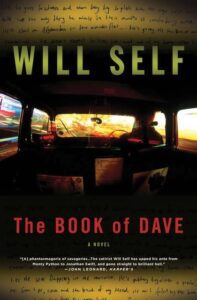
Author: Will Self
Publication Year: 2006
Length: 496 pages
Will Self is a weird man. Actually I know next to nothing about the man himself, despite now reading three of his books. I do know he’s a satirist (or absurdist) who loves to invent worlds filled with blobby creatures and oddball codes of behavior. These alternative universes are always grounded in something modern day, but are ultimately nasty, brutish and short.
The Book of Dave takes on one of his favorite targets: organized religion. The book is neither subtle nor subversive about this fact. His animosity about the absurd basis and wrong-headedness of religion is right out there for all of us to see.
Set in two different time periods, the early 2000s and five hundred or so years in the future, the narrative bounces back and forth in time by chapter, showing the cause and effect of this mad cabbie, Dave’s, actions on the world that his ancestors inherit. His madness manifests itself in a misogynistic rant against his ex-wife, the system and its treatment of fathers and a bunch of other nonsense. This madness unfortunately doesn’t stay locked in his head, but is literally written down and transferred to a book that he has stamped in metal and buried in his ex-wife’s backyard. The thing stays buried there for we don’t know how long, but is ultimately dug up by a post-apocalyptic London society and used as the basis of their new theocratic society. And who is their God? Why Dave, of course–the fat, bald alcoholic insane cab driver. Now you see where Self’s commentary against blind faith comes in.
So we have this eye into a future society that is based on a document written by an insane person, and it’s not a place we recognize–or is it? The irony is that after Dave’s psychotic break, and relative recovery, he begins to regret his old feelings and tries to repent only to realize that his old behavior (and the restraining order that came with it) keeps him from digging up the book from its hiding place. So ultimately this future society worships a God who wanted a do-over–wanted to take back everything.
The book itself isn’t the easiest read in the world, as the future folks speak a Mockney language that is basically a phonetic version of Cockney, which in itself is difficult enough, but is also filled with tons of slang based on Dave’s book and all its mention of taxi parts and his own made up slang for different kinds of people and things. I actually didn’t even realize there was a Mockney-to-English dictionary in the back of the book (a la A Clockwork Orange) until I had about ten pages left to read. You kind of got the idea what things mean in context, but there were a couple words for which I had no idea, but basically guessed at. I kind of got used to it by the end of the book, but was certainly relieved when a couple of the main future characters switched over to normal English for a long stretch. Mockney is supposed to be the language of the pious, the equivalent, I guess of Hebrew or Latin? This is all tied in with Dave’s cabbing experience, in which he had to speak with a Cockney accent just to fulfill some cabby stereotype, when in fact he spoke perfect English. Bitterness.
In the end, the book was pretty interesting, and I’m sure somewhat autobiographical in its treatment of divorce, child custody, paternity (which had a major part in the narrative) and its effect on children. Reading Self’s bio, it looks like he was married to woman, with whom he had a couple children and subsequently divorced. He, like Dave, had substance abuse issues and I’m going to guess probably had a battle on his hands with his ex-wife over the custody of his kids (generally the court frowns on heroin usage when you’re taking care of kids). Of course, I could just be fishing. Self is an acquired taste, no doubt, but the more I read by him, the more I wonder why more authors don’t do what he does. Maybe they just can’t.


